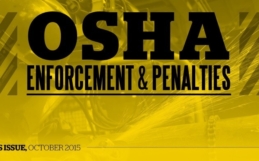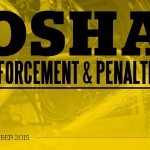Risk Insights – Transportation & Warehousing
Keeping Your Driver Fitness BASIC Scores Low
The Driver Fitness Compliance Behavior Analysis and Safety Improvement Category (BASIC) is one of seven categories that the Federal Motor Carrier Safety Administration (FMCSA) uses to determine how a motor carrier ranks relative to other carriers in its Compliance, Safety, Accountability (CSA) initiative.
The Driver Fitness BASIC addresses the requirements within the Federal Motor Carrier Safety Regulations (FMCSRs) and refers to the operation of commercial motor vehicles (CMVs) by drivers who are unfit to operate a CMV due to a lack of training, experience or medical qualifications.
The Driver Fitness BASIC Basics
A carrier’s measurement for each BASIC depends on the following:
- The number of adverse safety events (violations related to that BASIC or crashes)
- The severity of violations or crashes
- When the adverse safety events occurred (more recent events are weighted more heavily)
All roadside inspection violations that pertain to a BASIC are assigned a severity weight that reflects its association with crash occurrence and crash consequences. The violation severity weights are assigned on a 1 to 10 scale, with 1 representing the lowest crash risk and 10 representing the highest crash risk.
Keeping Scores Low
There are major benefits to keeping your Driver Fitness BASIC scores low. Not only does it help keep your fleet on the road as much as possible, low scores mean fewer accidents and safer drivers, as well as lower insurance costs. Here are some tips to keep those scores as low as possible:
- Know when drivers’ qualification documents expire. There are specific software solutions that will alert both you and your drivers that document renewal is forthcoming.
- Ensure all new hires can properly speak and communicate in English. Their English doesn’t have to be perfect, but all drivers should be able to converse, read traffic signs and understand all of their documentation.
- Stress the importance of eating healthy while on the road. Many rest stops now include healthy eating options, such as fresh fruits, vegetables and sandwiches. Encourage drivers to drink water or diet soda instead of sugar-sweetened drinks like regular soda and energy drinks.
- Prepare drivers for passing a physical examination. Teach them ways to get exercise while on the road, such as walking a few laps around their rig at a rest stop, or performing basic exercises in the sleeper.
- Keep Red Flag Violations top of mind with drivers. Create a visor card with the listed violations to remind them of their importance.
- Run periodic motor vehicle record (MVR) searches on your drivers. It’s probably impractical to run the reports daily or even weekly, but you can keep closer tabs on your drivers and avoid potential violations if done monthly or twice a year.
- Offer incentives for clean MVRs. Let drivers know you appreciate their safety efforts, and they will be more likely to continue their safe ways.
- Do not tolerate drivers who rack up high scores and refuse to change their ways. The CSA initiative is not going anywhere—it’s in your best interest to hire drivers that buy in to the system and practice safety.
- If there is an erroneous violation on a driver’s record, appeal it. If you have a good basis for the appeal—such as GPS records of the driver’s speed at the time of a speeding ticket—there is a good chance it can be expunged from the record. Use the DataQs system to appeal.
How Do You Measure Up?
FMCSA’s Safety Measurement System (SMS) determines an overall BASIC status for each motor carrier based upon roadside inspection results that are reflected as a percentile rank and/or prior investigation violations. You and your drivers can check scores by visiting the SMS website at https://ai.fmcsa.dot.gov/sms/.
For more information visit COMMERCIAL TRUCKING INSURANCE or contact a SW Risk Trucking Specialist today at (480) 290-2222.









